- Home
- Robin McKinley
The Hero And The Crown d-2 Page 6
The Hero And The Crown d-2 Read online
Page 6
But it was also at this wedding that a new and troubling rumor about the king’s daughter began, a rumor that Galanna did not have to start, for more eyes than hers observed and drew conclusions similar to hers without the spur of wounded pride and jealousy. The king’s daughter, Aerin-sol, stood at her father’s left hand, as was proper; she wore green, a long dress, the skirts nearly as full as Galanna’s, but this was only to show her cousin proper respect. The lace of her bodice was modest, and she wore but two rings, one of the house of the king, and one her father had given her on her twelfth birthday; her hair was bound primly to the back of her neck, and she carried only a small yellow-and-white posy of ringaling flowers. Aerin would not have wished to outshine Galanna even if she could, and had argued with Teka over every stitch of the dress and every braid of her bound hair, and tried to get out of carrying flowers at all.
The king and his daughter stood to the right of the wedding pair, and the first companions stood across from them; and it was obvious to many pairs of eyes that Perlith’s first companion’s gaze rested not on the bride but on the king’s daughter; and the irony was that had he not been standing first companion he would have been on the king’s right hand, where he could not look at Aerin-sol whether he wished to or not, and so his secret might have been kept a little longer.
The rumor began that day, for the people at the wedding feast passed it among themselves, and took it home with them afterward, that the first sola was in love with the king’s daughter; and that the witch’s daughter would entrap the next king of Damar as her mother had entrapped her father; and a little breath of fear was reawakened—for Aerin’s Giftlessness had been reassuring—and accompanied the rumor.
Galanna, who had hoped to make Tor just a little sorry after all that he had not married her, had her day of glory almost ruined when at last she noticed where her new husband’s first companion’s eyes were tending; but anger became her, so long as she kept her tongue between her lips. It was almost worth it, for a few days later one of her dumber but most well-meaning ladies mentioned, worriedly, to her that someone had said that Tor was falling under the spell of the witch woman’s daughter, and that history was to repeat itself. “I don’t quite know what she meant, do you?” said the lady, frowning. “Aerin-sol’s mother was queen; it would be a most suitable match,”
Galanna laughed her most light-hearted laugh. “You are so young,” she said caressingly. “It was a terrible scandal when Arlbeth married Aerin’s mother. Didn’t you know that Aerin’s mother was from the North?”
The lady, who had grown up in a small town to the south, did not know, and her eyes opened wide; Galanna could read her eagerness to have an interesting fresh slice of gossip to slip into the conversation the next time she and her friends gathered together. “Oh, Arlbeth certainly married her,” Galanna said gently, “but she wasn’t exactly queen.” She made it sound as if Arlbeth’s only excuse for such a liaison was misguided passion and, blinded by that passion, perhaps he hadn’t quite married her at all. She let this sink in a moment—the lady was very stupid, and had to be played carefully—and then, seeing dawning comprehension in the lady’s eyes, sent her gently and kindly, that the comprehension would not be joggled loose again, about her business.
Aerin herself bore up under the wedding and the feast afterward as best she could, but as this meant that she withstood them stoically as a martyr might withstand torture, she did not notice either Tor’s eyes or Galanna’s fury—she was only too accustomed to ignoring Galanna whenever possible; the one thing she did observe about the bride was the twelve rings, which were hard to miss—nor did she notice any more than usual stiffness in the courtesy that those around her offered her. And Tor, who was either viewed as dangerously enamored and therefore to be treated with caution, or as pitiably misguided and thus to be protected—or, as a few implausibly simple souls believed, capable of deciding his own fate—did not know till much later all that he had betrayed.
Aerin peeled out of her fancy clothes and fancy manners and pelted off to the barns at the first opportunity, and thought no more about weddings.
She had taken some time away from her leather-working to begin experimenting with the fire ointment. Most of the ingredients she found easily, for they were common things, and a first sol’s education included a little basic herb-lore—which Aerin had learned gladly as an escape from deportment and history. One or two things she asked Hornmar for, from his stock of horse cures; and he, thinking she wished perhaps to try some sort of poultice on Talat’s weak leg, granted her the run of his medicines as he had his tool chest, and again asked no questions. She was aware of the great boon he offered her, and this time she couldn’t help but look at him a little wonderingly.
He smiled at her. “I love Talat too, you know,” he said mildly. “If I can aid you, you need only to ask.”
Teka and the redroot were a little more difficult.
“Teka, what is redroot?” Aerin asked one afternoon as she applied an uneven patch to a skirt she had always detested, and glowered at the result.
“If you spent a quarter of the time about your mending that you have over that old saddle, you would be better turned out than Galanna,” said Teka with asperity. “Rip that out and do it again.”
Aerin sighed, and began to pick at the irregular stitches. “I suppose there’s no point in mentioning that I have no desire to be better turned out than Galanna.” She picked a moment in silence and added, “For that matter, Galanna never wears anything that has a patch or a tear.”
Teka grinned. “No. She takes out a great gash and puts in a whole new panel of different cloth, and it’s a new dress.”
“I would like to make a new floor mop out of this thing,” replied Aerin.
Teka lifted it out of Aerin’s hands and squinted at it. “The color has not worn well,” she explained, “but the cloth is sound. We could re-dye it.” Aerin did not show any marked access of enthusiasm for this plan. “Blue perhaps, or red. Don’t overwhelm me with your gladness, child. You’re always wanting to wear red, in spite of your flaming hair—”
“Orange,” murmured Aerin.
“You could do quite well with this skirt in red, and a golden tunic over—Aerin!”
“It would still have to be patched,” Aerin pointed out.
Teka sighed heavily. “You would try the patience of Gholotat herself. If you will do something useful with that wretched bridle that has been lying under the bed for the last fortnight, I will re-dye your poor skirt, and put a patch on it that not even Galanna will notice—as if you cared.”
Aerin reached out to hug Teka, and Teka made a noise that so sounded like “Hmmph.” Aerin fell off the window seat and made her way over to the bed on her hands and knees and began to scrabble under it. She re-emerged only slightly dusty, for the hafor were dutiful floor-sweepers, held the bridle at arm’s length and looked at it with distaste. “Now what do I do with it?” she inquired.
“Put it on a horse,” Teka suggested in a much-tried tone.
Aerin laughed. “Teka, I am inventing a new way to ride. I don’t use a bridle.”
Teka, who still occasionally watched Aerin and Aerin’s white stallion in secret to reassure herself that Talat would do her beloved child no harm, shuddered. It was the luck of the gods that Teka had not been watching the day Talat had jumped the fence. “I don’t want to hear about it.”
“Someday,” Aerin went on with a bold sweep of her empty hand, “I shall be famous in legend and story—” She stopped, embarrassed to say such things even to Teka.
Teka, holding the skirt to the light as she made deft invisible stitches around the patch, said quietly, “I have never doubted it, my dear.”
Aerin sat down on the edge of the bed with the bridle in her lap and looked at the fringe on the bed curtains, which were the long golden manes of the embroidered horseheads on the narrow canopy border, and thought of her mother, who had died in despair when she found she had borne a daughter instead
of a son.
“What is redroot?” she asked again.
Teka frowned. “Redroot. That’s—um—astzoran. Red-root’s the old term for it—they used to think it was good for some things.”
“What things?”
Teka glanced at her and Aerin bit her lip. “Why do you want to know?”
“I—oh—I read a lot in the old books in the library while I wasn’t ... feeling quite well. There was some herb-lore, and they mentioned redroot.”
Teka considered, and some of her thoughts were similar to Tor’s when Aerin had asked him to teach her swordplay. Teka had never thought about whether Aerin’s fate had more to do with what Aerin was or what Damar was, or for reasons beyond either; Teka merely observed that Aerin’s fate was unique. But she knew, knew better even than the cousin who loved her, that Aerin would never be a court lady; not like Galanna, who was a beautiful termagant, but neither like Arlbeth’s first wife, Tatoria, whom everyone had loved. None of the traditions of Arlbeth’s court could help the king’s daughter discover her fate; but Teka, unlike Aerin herself, had faith that the destiny was somewhere to be found. She hesitated, but she could remember nothing dangerous about the no longer valued redroot.
“Astzoran doesn’t grow around here,” said Teka; “it is a low weedy plant that prefers open meadows. It spreads by throwing out runners, and where the runner touches the earth a long slender root strikes down. That is the redroot.” Teka pretended great concentration upon her patch. “I might take a few days to ride into the meadows beyond the City and into the Hills; I am reminded that there are herbs I need, and I prefer to gather my own. If you wish to come, I will show you some astzoran.”
Teka asked no questions when Aerin rolled up a small herb bundle of her own and tied it to Kisha’s saddle during their journey, a bundle that included several long thready roots of astzoran, and if any of the outriders noticed (for Teka only rode at all under duress, and even on her slow, sleepy, elderly pony she felt much safer with several other people around), they said nothing either.
The ointment recipe, Aerin found, was not as exact as it might be. She made one mixture, spread some of it on one finger, and thrust the finger into a candle flame—and snatched it out again with a yelp. Three more mixtures gained her three more burnt fingers—and a terrific lecture from Teka, who was not, of course, informed as to the details of why Aerin seemed intent on burning her fingers off. After that she used bits of wood to smear her trial blends on; when they smoked and charred, she knew she had not yet got it right.
After the first few tries she sighed and began to keep careful notes of how each sample was made. It was not an exercise natural to her, and after she’d filled several sheets of parchment with her tiny exact figures—parchment was expensive stuff, even for kings’ daughters—she began to lose heart. She thought: If this mess really worked, everyone would know of it; they would all use it for dragon-hunting, and-would have been using it all along, and dragons would no longer be a risk—and that book would be studied and not left to gather dust. It is foolish to think I might have discovered something everyone before me had overlooked. She bowed her head over her burnt twig, and several hot tears slipped down her face onto her page of calculations.
Chapter 7
ON HER EIGHTEENTH BIRTHDAY there was a banquet for the first sol, despite all she could do to prevent it. Galanna shot her glances like poisoned arrows and clung curiously near Tor’s side for someone else’s wife of so few seasons. Perlith made witty remarks at Aerin’s expense in his soft light tenor that always sounded kind, whatever he might be saying. The king her father toasted her, and the faces around the tables in the great hall glittered with smiles; but Aerin looked at them sadly and saw only the baring of teeth.
Tor watched her: she was wearing a golden tunic over a long red skirt; the tunic had embroidered flowers wound round its hem, and petals of many colors stitched drifting down the full sleeves; she wore the same two rings she had at Galanna’s wedding. Her flame-colored hair was twisted around her head, and a golden circlet was set upon it, and over her forehead three golden birds held green stones in their beaks. He saw her wince away from the courtiers’ smiles, and he shook Galanna’s hand from his arm impatiently, and then Galanna no longer even pretended to smile.
Aerin did not notice this, for she never looked at Galanna if she could help it, and if Galanna were near Tor she didn’t look at Tor either. But Arlbeth noticed. He knew what it was that he saw, for better or for worse, and it was not often that he did not know what was best done about the things he saw; but in this case he did not know. What he read in Tor’s face tore at his heart, for it would be his heart’s fondest wish that these two might wed, and yet he knew his people had never loved the daughter of his second wife, and he feared their mistrust, and he had reason to fear it. Aerin felt her father’s arm around her shoulders, and turned to smile up at him.
After the banquet she went to sit in her window seat, staring into the dark courtyard; the torches around its perimeter left great pools of shadow near the castle walls. Her bedroom was dark as well, and Teka had not yet come to be sure she had hung her good clothes up as she should instead of leaving them on the floor where she would step on them. There was a light knock on the door. She turned and said, “Come in,” with surprise; if she had thought about it, she would have been silent and let the visitor leave without finding her. She wished to be alone after the hall full of food and talk and bright smiles.
It was Tor. She could see him outlined in the light from the hall, and she had been sitting in the dark long enough to see clearly. But he blinked and looked around, for her figure was only a part of the heavy curtains that hung around the deep window alcove. She stirred, and he saw the flicker of her red skirt.
“Why do you sit in the dark?”
“There was too much light in the hall tonight.”
Tor was silent. After a moment she sighed, and reached for a candle and flint. It seemed to Tor that the shadows it cast upon her face made her briefly old: a woman with grandchildren, for all her brilliant hair. Then she set the candle on a small table and smiled at him, and she was eighteen again.
She saw that he carried something in his arms: a long narrow something, wrapped in dark cloth. “I have brought you your birthday present—privately, as I thought you might prefer.” And so that I need not do any explaining, he thought.
She knew at once what it was: a sword. She watched with rising excitement as he unrolled the wrappings, and from them, gleaming, came her sword, her very own sword. She reached for it eagerly, and slid it out of its scabbard. It was plain but for some work on the hilt to make the grip sure; but she felt it light and true and perfect in her hand, and her hand trembled with the pride of it.
“Thank you,” she said, her eyes still fixed on the sword, so she did not see the look of hope and pity on Tor’s face as he watched her.
“At dawn you shall try it out,” said Tor, and the tone of his voice shook her out of her reverie, and she raised her eyes to his. “I will meet you at our usual place,” he said, and tried to speak as if this were a lesson like any other lesson; and if he failed, Aerin still did not guess why he failed.
“This is ever so much better than another dressing gown,” she said lightly, and was pleased to see him smile.
“It was a very beautiful dressing gown.”
“If it had been less beautiful, I would not have disliked it so much. You were as bad as Teka, trying to keep me in bed, or trailing about my rooms in a dressing gown forever.”
“And a lot of good it did us, despite the fact that you could not stand on your feet without either fainting or falling over.”
“It was concentrating on my lessons with you that finally sweated the last of the surka out of me,” Aerin said, waving her birthday present gently under his nose.
“I almost believe you,” he replied sadly.
So they were standing, looking at each other, with the naked blade upheld between them, when Teka
come through the open door behind them. “Gholotat protect us,” said Teka, and closed the door behind her.
“Is my birthday present not beautiful?” said Aerin, and turned the blade back and forth quickly so that it winked at her old nurse as she stood by the door. Teka looked at her face and then at Tor’s, and then back at Aerin’s, and said nothing.
“I will bid you good night,” said Tor, and because Teka was there he dared reach out his hands to Aerin, and put them on her shoulders, as she slid her sword into its scabbard, and kiss Her cheek as a cousin might; which he would not have dared had they been alone. He bowed to Teka, and left them.
Perhaps it was having a real sword of one’s own. Perhaps it was being eighteen—or that eighteen years’ practice of being stubborn was finally paying off. If she still stumbled over the corners of rugs or bumped into doorways while she was thinking about other things, she no longer bothered looking around anxiously to find out if anyone had seen her: either they had or they hadn’t, and she had other things on her mind; she reveled in those other things. They meant that she did not blush automatically when she caught sight of Perlith, knowing that he would have thought of something to say to her since the last time she had failed to avoid him, and that his little half smile beneath half-lidded eyes would make whatever he said worse. She walked through the halls of the castle and the streets of the City the most direct way instead of the way she would meet the fewest people; and she avoided the surka in the royal garden, but only that it might not make her sick again. She did not cringe from the thought of its presence, or from the shame that she had to avoid it in the first place; nor did she any longer feel that breathing the garden air was synonymous with breathing Galanna’s malice.

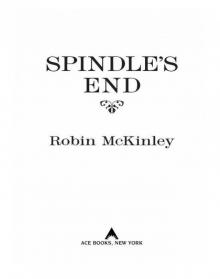 Spindle's End
Spindle's End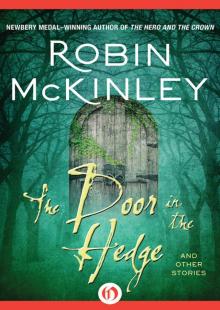 The Door in the Hedge: And Other Stories
The Door in the Hedge: And Other Stories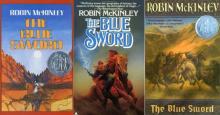 The Blue Sword
The Blue Sword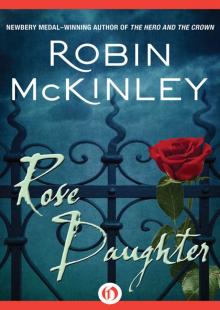 Rose Daughter
Rose Daughter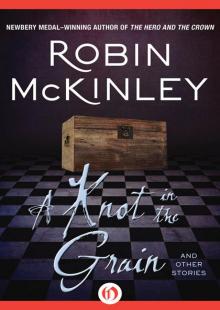 A Knot in the Grain and Other Stories
A Knot in the Grain and Other Stories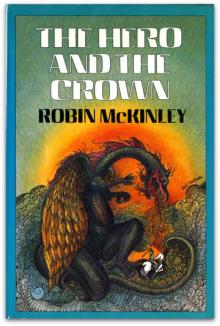 The Hero And The Crown
The Hero And The Crown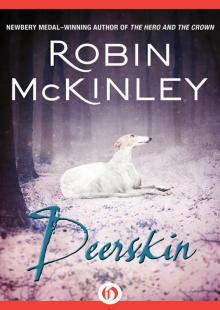 Deerskin
Deerskin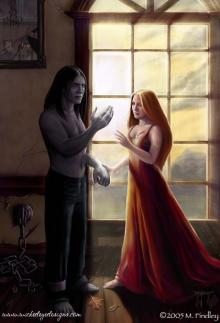 Sunshine
Sunshine Beauty: A Retelling of the Story of Beauty and the Beast
Beauty: A Retelling of the Story of Beauty and the Beast Shadows
Shadows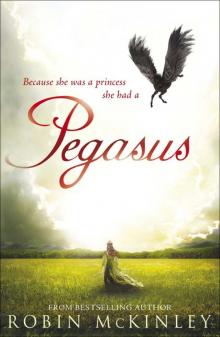 Pegasus
Pegasus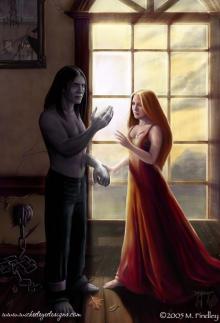 Chalice
Chalice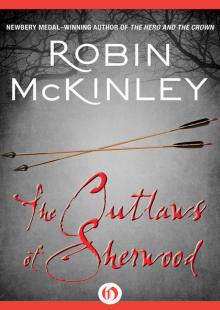 The Outlaws of Sherwood
The Outlaws of Sherwood Fire: Tales of Elemental Spirits
Fire: Tales of Elemental Spirits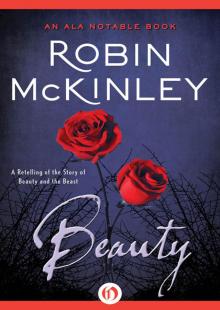 Beauty
Beauty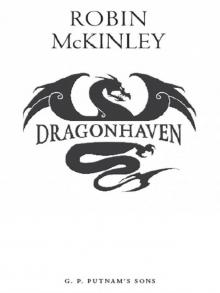 Dragon Haven
Dragon Haven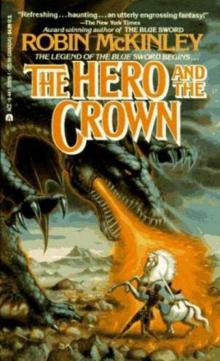 The Hero And The Crown d-2
The Hero And The Crown d-2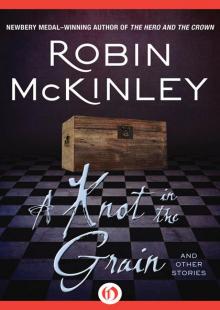 A Knot in the Grain
A Knot in the Grain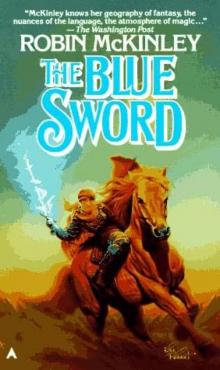 The Blue Sword d-1
The Blue Sword d-1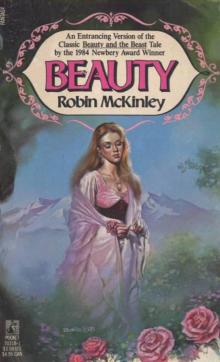 Beauty (v1.2)
Beauty (v1.2)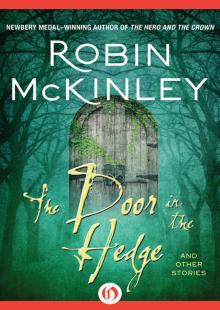 The Door in the Hedge
The Door in the Hedge